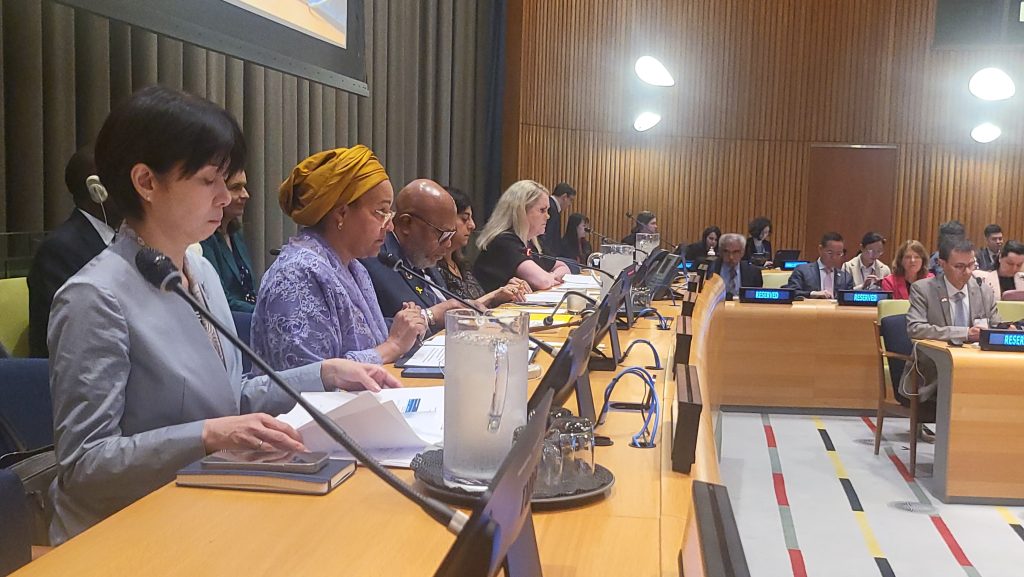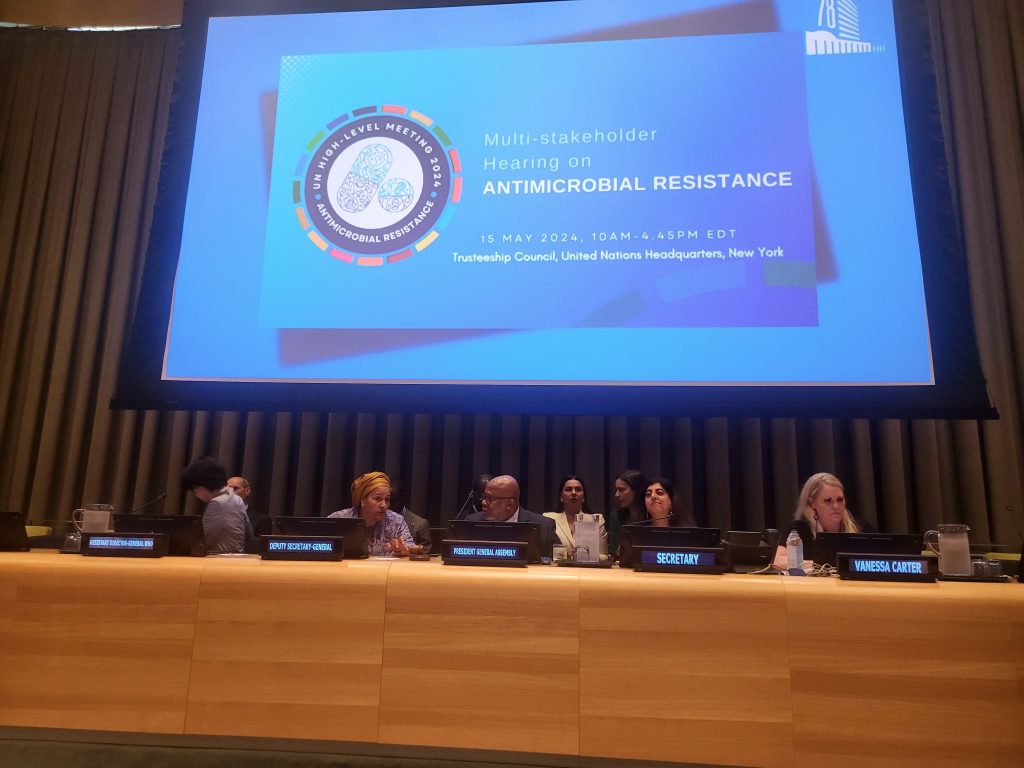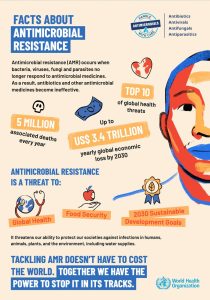Objective
The multi-stakeholder hearing will provide an opportunity for stakeholders to contribute to the on-going preparatory process for the high-level meeting on AMR. Participants will exchange views on key priorities for the high-level meeting and its political declaration, while exploring key challenges and potential solutions needed for effectively addressing AMR at the national, regional and global levels.
Audience
The multi-stakeholder hearing will bring together representatives of regional organizations, non-governmental organizations in consultative status with the Economic and Social Council, invited civil society organizations, philanthropic foundations, academia, medical associations, and the private sector including the agriculture and food industry, broader communities, as well as appropriate senior-level representatives of Member States, observers of the General Assembly, parliamentarians, representatives of local governments, and relevant United Nations entities.
Outcomes
The President of the General Assembly will prepare a summary of the hearing prior to the high-level meeting.
Format
The hearing will include an opening segment, three interactive panel discussions, and a closing segment. Each panel discussion will include statements from panelists, to be followed by an interactive segment. There will be no pre-established list of speakers and participants will be invited to indicate their interest to intervene during the panels.
Panel 1: Adequate, predictable, and sustainable financing of and investments in the AMR response to support country-level implementation
Panel 2: Addressing antimicrobial access, research and development (R&D), and innovation.
Panel 3: Effective governance, leadership, and coordination of the AMR response at the national, regional and global levels
Remarks by the President of the General Assembly, Mr. Dennis Francis, Opening Segment of the Multi-stakeholder Hearing of the High-level Meeting on Antimicrobial Resistance
Remarks by the President of the General Assembly,
Mr. Dennis Francis,
Opening Segment of the Multi-stakeholder Hearing of the High-level Meeting on Antimicrobial Resistance
Wednesday, 15 May 2024, 10.00 AM, Trusteeship Council Chamber,
[As Delivered]
Ms. Amina J Mohamed, Deputy Secretary-General of the United Nations,
Dr. Yukiko Nakatani, Assistant Director-General of the World Health Organization,
Ms. Vanessa Carter, Antimicrobial Resistance Survivor and Executive Director of the AMR Narrative,
Excellencies,
Delegates,
Ladies and Gentlemen,
It gives me great pleasure to welcome you all at this multistakeholder hearing on Anti-microbial Resistance in the presence of our hard-working Deputy Secretary-General, whose extraordinary preoccupation with the spectrum of issues related to sustainable development has risen to such an extent as perhaps to be considered a calling.
I extend my gratitude to the World Health Organization, the Food and Agriculture Organization, the United Nations Environment Programme, and the World Organization for Animal Health for their support in organizing this important event.
As we gather here today, a silent pandemic – antimicrobial resistance (AMR) – accounts for nearly five million deaths annually.
Left unaddressed, it is estimated that AMR could cause up to 10 million deaths per year by 2050. Moreover – if left unchecked – AMR will render the medicines we depend on to keep us safe and healthy practically ineffective. Despite the magnitude of its global impact – as a pressing health challenge – it is concerning that currently AMR does not command either sufficient attention or awareness.
It is therefore a public interest necessity that we change this immediately – because tackling AMR is vital to achieving the 2030 Agenda for Sustainable Development, especially within the frameworks of universal health coverage, resilient health, environmental sustainability, and sustainable agri-food systems.
Indeed, the implications of AMR cuts across multiple SDGs. Our success in addressing AMR will, therefore, favourably influence our progress on all the SDGs – given their interlinkages.
The upcoming high-level meeting on AMR – which is scheduled for 26 September 2024 – offers a timely opportunity to mobilize much-needed political will, and to bolster international cooperation, in this looming threat to the public health and thus to the stability of society.
I should like to commend the co-facilitators, Their Excellencies François Jackman and Vanessa Frazier – the Permanent Representatives of Barbados and the Republic of Malta, respectively – for their notably dedication and leadership on the negotiations on the political declaration on AMR, to be adopted in September.
Excellencies,
It cannot be overemphasized that AMR disproportionately affects developing countries.
While these countries bear the brunt of its impacts, they also lack the financial resources and capacity to overcome them without support.
What is needed to remedy this, is a robust show of solidarity on the part of the international community, through strengthened international cooperation, enhance capacity-building initiatives – and more importantly, demonstration of a strong commitment to the facilitation of technology transfer.
Such a posture of solidarity and goodwill will support developing nations in their AMR response – strengthening sustainable health and agri-food systems, improving surveillance and monitoring, and enhancing environmental interventions, such as waste and wastewater management, while at the same time, promoting responsible antimicrobial use.
As a strategic matter, we must also address the disproportionate burden of AMR on the most disproportionately affected, especially women and girls.
Not only do they often bear primary caregiving responsibilities – many also work in the agricultural sector, with high exposure to pesticides and antimicrobials; and yet typically have less access to healthcare.
Policymakers must therefore recognize and indeed address gendered differences in experiences and health outcomes.
Accordingly, they should strive for inclusivity in decision-making and amplify efforts to provide equitable access to healthcare services, education, and economic opportunities for women.
Dear Friends,
In closing – as preparations for the high-level meeting in September continue – we must remember that strong political will and leadership at the highest levels are indispensable in addressing the multidimensional challenges posed by AMR.
I urge Member States to integrate AMR considerations into their national SDG strategies and monitoring frameworks – also as a priority in national agendas, broader health, agri-food, environmental, and developmental policies, and actions.
Effectively addressing this issue demands the collective efforts of a diversity of stakeholders across sectors, many of whom are represented here today – involving civil society organizations, philanthropic foundations, academia, medical associations, the private sector; and also drawing from perspectives of women, youth, and indigenous communities.
Our overarching goals must be to accelerate multisectoral actions at the global, regional, and national levels – building upon the commitments set forth in the 2016 Political Declaration on AMR.
I am optimistic that today’s discussions will delve into key policy areas and yield productive outcomes – guiding us to invest more effectively in our present while securing our future.
In accordance with the relevant mandate, I will share a summary of this hearing with all Member States and observers of the General Assembly, prior to the high-level meeting.
I trust that the summary will serve as a valuable resource for the upcoming high-level meeting discussions on the political declaration – ensuring actionable commitments in September, that will help us control antimicrobial resistance.
I thank you.
Video Remarks
For all videos and behind-the-scenes, Follow #OPGA78 YouTube 
PGA’S Letter on AMR Multistakeholder Hearing
Concept Note
Antimicrobial resistance (AMR) is invisible. I am not
Recognizing the importance of humanizing antimicrobial resistance (AMR), and in anticipation of forthcoming high-level meetings on AMR, the World Health Organization (WHO) is launching a special AMR awareness campaign. Its purpose is to bring survivors’ stories to the forefront, urging individuals to pause and contemplate how collective efforts can help prevent AMR.
The campaign theme is “Antimicrobial resistance (AMR) is invisible. I am not”, which aims to place AMR survivors front and center, allowing us to talk about the growing, serious threat of AMR in a grounded, factual and relatable manner. AMR is invisible, but its victims are not.
Through the campaign, 12 survivors and advocates share their real-life stories, raising awareness and urging global action to address AMR. AMR concerns us all and can happen to anyone at any time, regardless of age, gender, wealth, or nationality.
A list of multilingual communication materials (videos, survivors quote cards, social media fact cards, infographic, posters, printable calendars, brochure for healthcare professionals, campaign guide and media toolkit) have been developed to promote this campaign.
You can easily download these editable resources to use and share with your networks.
Use the #AntimicrobialResistance hashtag to help us follow the conversation.
AMR is a problem for all countries at all income levels. Its spread does not recognize country borders. Contributing factors include lack of access to clean water, sanitation and hygiene (WASH) for both humans and animals; poor infection and disease prevention and control in homes, healthcare facilities and farms; poor access to quality and affordable vaccines, diagnostics and medicines; lack of awareness and knowledge; and lack of enforcement of relevant legislation. People living in low-resource settings and vulnerable populations are especially impacted by both the drivers and consequences of AMR.
The impact of antimicrobial resistance extends well beyond human health.
AMR could result in US$ 1 trillion additional healthcare costs by 2050 and up to US$3.4 trillion in GDP losses per year by 2030.
Follow the AMR multistakeholder hearing live on 15 May.
Key documents
- PGA Letter – AMR multistakeholder hearing_15 May 2024
- Concept Note – AMR Multistakeholder Hearing
- Letter from President General Assembly on AMR Roadmap | General Assembly of the United Nations
- AMR Hearing – Preliminary Programme
- PGA letter – AMR multistakeholder hearing Programme
- PGA Letter- AMR HEARING _2024-05-14-17-21-38
- AMR Hearing – Final Programme
- PGA Letter AMR Political Declaration







